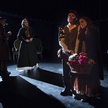Pygmalion
It is the turn of the 20th century and in a newly-industrialised England, class barriers are breaking down.
Eliza Doolittle – an aspirational young flower girl with no money and unintelligible speech – sees a chance to escape the destiny of her birth. Language lessons from the wealthy, bullying, funny, linguistics professor Henry Higgins seem like just the ticket. But a ticket to what?
The outcome of her training is not what she or her teacher expected. As Higgins endeavours to mould Eliza to his vision of the perfect lady, disregarding her autonomy as a unique human being, conflicting emotions and desires start to play an unexpected part.
This production of Shaw’s most popular play will embrace the aesthetic of Steampunk to explore subjects of class division and social mobility in a world where people’s worth is judged not by who they are but by the way they speak. Though reflecting the shuttered and stifling nature of Edwardian society, there are profound parallels to our own.
Cast & Crew
Cast
| Alfred Dolittle | Mark Norton |
|---|---|
| Clara Eynsford Hill | Tiffany Hoy |
| Colonel Pickering | Shan-Ree Tan |
| Eliza Dolittle | Emma Wright |
| Eric the Bystander | Vitas Varnas |
| Freddy | Robert Snars |
| Mrs Eynsford Hill | Tricia Youlden |
| Mrs Higgin’s housemaid | Lisa Kelly |
| Mrs Higgins | Colleen Cook |
| Mrs Pearce | Natasha McDonald |
| Professor Henry Higgins | Steve Corner |
| Sadie the Bystander | Emilia Kriketos |
| Willem the sarcastic Bystander | Sean Taylor |
Crew | |
| Accent Coach | Helen Tonkin |
| Assistant Director | Gundega Lapsa |
| Assistant Stage Manager | Emilia Kriketos |
| Assistant Stage Manager | Sean Taylor |
| Assistant Stage Manager | Vitas Varnas |
| Costume Assistant | Fiona McClintock |
| Deputy Stage Manager | Neil Parikh |
| Director | Deborah Mulhall |
| Lighting Designer | Mehran Mortezaei |
| Set Designer | Tom Bannerman |
| Sound Designer | Patrick Eades |
| Stage Manager | Victoria Lewis |
- Production website
- Added by Brian Hodges.
- Add an observation
- Edit this production
- I saw this production
- This is a duplicate of another production
If you have a photograph or picture that illustrates this production, please sign in to upload it, or add it to Flickr and tag it with .
Play description
Pygmalion is a play by George Bernard Shaw, named after a Greek mythological character who fell in love with one of his sculptures which later came to life.
It was first presented on stage to the public in 1913.
Professor of phonetics Henry Higgins makes a bet that he can train a bedraggled Cockney flower girl, Eliza Doolittle, to pass for a duchess at a ball by teaching her to assume a veneer of gentility, the most important element of which, he believes, is impeccable speech. The play is a sharp lampoon of the rigid British class system of the day and a commentary on women’s independence.
Shaw mentioned that the character of Professor Henry Higgins was inspired by several British professors of phonetics: Alexander Melville Bell, Alexander J. Ellis, Tito Pagliardini, but above all, the cantankerous Henry Sweet.
Photo credits
Observations
If you have an interesting observation or anecdote about this production that you think others may be interested in, please sign in in order to record it here.















